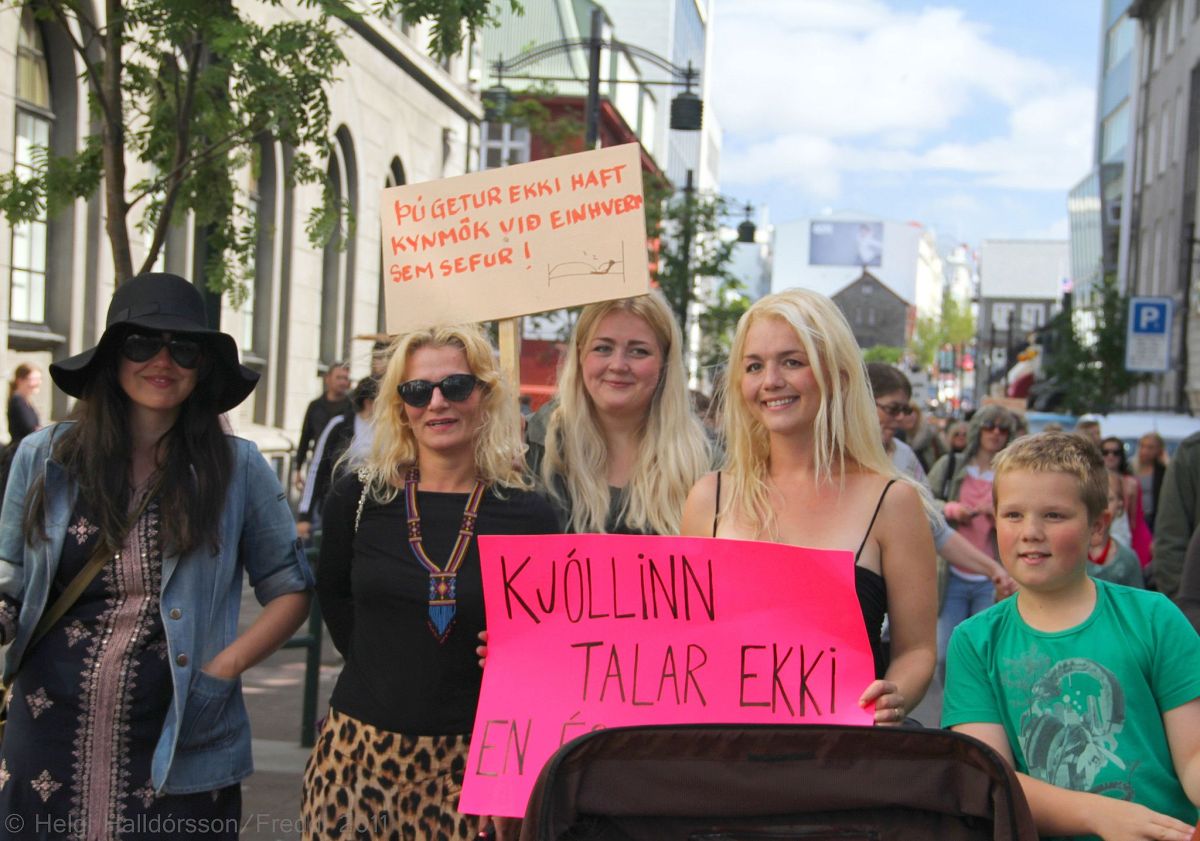Tuesday’s election results were a gut punch for women seeking to make history. While we all gather our wits, we can look to the feminists of Iceland and the lessons they can teach us. Icelandic women didn’t invent protest or collective action, but they’ve made great strides which can inspire us to keep going.
Women swept this year’s elections in Iceland, winning 30 of 63 Parliament seats. While the current president of Iceland is male, women have held the position of president or prime minister for 20 out of the last 36 years. Iceland is much smaller than the United States, their population of approximately 330,000 overshadowed by our 320 million. But like American women, they comprise about half the population, and have achieved goals like paid parental leave for both sexes and higher education rates for girls. Their methods can work for us.
First, think big. Iceland’s modern feminist movement kicked off on Oct. 24, 1975, when 90 percent of women went on strike. They took one day off from employment, housework and child care. Ten percent of the female population gathered for a rally in Reykjavik on that day, while men struggled to balance everything they normally relied on women to do. (In America, where many of these tasks disproportionately go to low-income women of color, this sort of tactic would highlight the necessity of forming strong bonds across racial and class lines. This won’t happen without lines of support for those who can’t ordinarily afford to participate.)
Women went back to work the next day, but their message for equal respect and rights was heard. One year later, the Gender Equality Council was formed and Parliament passed the Gender Equality Act, making it illegal to discriminate in the workplace and in school. One massive action impacting society on all levels yet remaining nonviolent can do wonders.
Second, find a unifying goal. Trade unions and radical women’s rights groups came together for the 1975 event. The word “strike” was too uncomfortable for older, conservative women, so it was changed to “Women’s Day Off,” giving it a softer tone and insuring that working women wouldn’t be fired or penalized by the unions. On that day, they focused on equal rights and equal pay. Those issues cut across social standing and class, so there was more participation. After this election, we now know many women voted for the male candidate because of economic concerns. Listen to those concerns, and make them a part of the next set of goals for women’s rights. (Editor’s note: It’s important to remember that unity needn’t come at the cost of accountability. Issues like racism and transphobia shouldn’t be allowed to foster in any successful feminist action; if you encounter this in your activist circles, speak up and insist that they be addressed.)
Third, connect with each other. Organizing any event should involve both online and offline meetings so women can work out differences and bond over common goals. In 1975, women met up in cafes and other public spots to organize the Women’s Day Off. Today, one-third of Iceland’s female population belongs to a single, closed Facebook group, according to ITV. The group is similar to the secret U.S. Facebook group Pantsuit Nation, which was created less than a month before the election and exploded to 3 million members by Election Day. That, or a similar activist group yet to be formed, could have just as much impact on U.S. society and politics as Icelandic women did in their country.
Fourth, don’t give up. You have to be in this for the long haul. Keep the pressure on those in charge. Celebrate the successes as you find them. The Presidential race was lost, but we gained the first Latina senator, the first Indian-American women in Congress, and the first openly LGBT governor in Oregon, among many others. One landmark leads to another, like dominoes. Five years after Iceland’s 1975 event, Vigdis Finnbogadóttir was elected as Iceland’s first female president. She beat three other male candidates and was re-elected twice. In 1983, the newly formed Women’s Alliance party began winning seats in Parliament. In 2010, Iceland elected its first openly LGBT female prime minister. But they still fight: last month, Icelandic women walked out of work at 2:38 p.m. to protest the remaining 14 percent wage gap.
Most of all, remember the fear, anger and sadness you feel right now and make it work for you. “Go high” using the tools utilized by the literal daughters of Vikings and keep changing the world in ways big and small.
featured image via Wikimedia Commons
Want more stories like this? Become a subscriber and support the site!
Beth Bartlett is a freelance writer and geek/pop culture blogger for GeekMom and the Huffington Post. You can also find her at her own book blog, BookNerdvana.
—The Mary Sue has a strict comment policy that forbids, but is not limited to, personal insults toward anyone, hate speech, and trolling.—
Follow The Mary Sue on Twitter, Facebook, Tumblr, Pinterest, & Google+.









Published: Nov 13, 2016 11:00 am